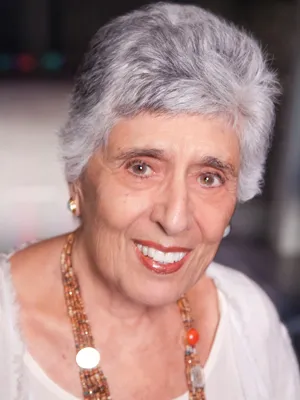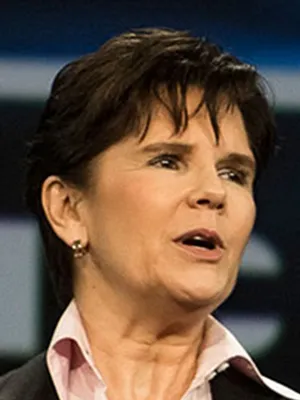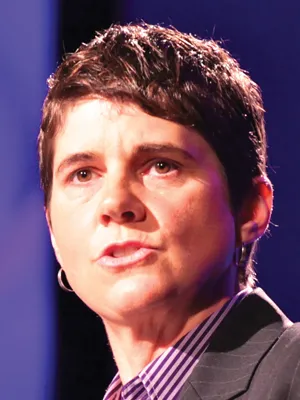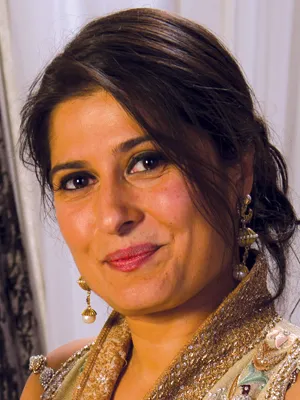They Are Smith: A Rally Day Preview of the 2016 Smith College Medalists
News of Note

Published February 15, 2016 (UPDATED: February 16, 2016)
The four extraordinary alumnae who are recipients of this year’s Smith College Medal come from different fields, different eras of Smith history and have followed different paths to success.
Updated—Business leader Phebe Novakovic ’79 has notified the college that she will be unable to attend this year’s Rally Day ceremony.
What they have in common are achievements that have had a noteworthy impact on their communities—and the world.
The 2016 medalists are:
- Arts patron Joan White Harris ’52
- Business leader Phebe Novakovic ’79
- Social justice activist Kim (Rea) Carey ’89
- Documentary filmmaker Sharmeen Obaid-Chinoy ’02.
In receiving their awards, this year’s honorees will join more than 200 alumnae who have been named Smith Medalists since 1962. Smith College Medals will be presented at Rally Day Wednesday, Feb. 17, at 1:30 p.m. in John M. Greene Hall.
Students, faculty and staff will have a chance to meet the award winners at a reception following the convocation.
This year’s Rally Day celebrations are organized around the theme “We Are Smith.”
View a gallery of photos from the event.
As a preview, here are some fun facts—and thoughtful quotes—from this year’s Smith medalists.
Joan White Harris ’52, President, Irving Harris Foundation
- Harris grew up wanting to be a pianist and initially studied music theory and cello at Smith. (“I almost flunked out of college because of the cello,” she quips.) She graduated with a degree in government and a lifelong passion for democracy and social justice.
- Along with her late husband, philanthropist Irving Harris, she founded a Chicago performing arts theater that helped lead a resurgence of the city’s nonprofit arts scene. The Joan W. and Irving B. Harris Theater for Music and Dance opened in 2003—the first multi-arts venue to be built in the city’s downtown since 1929.
- President Barack Obama is a fan. In awarding her the National Medal of Arts in 2014, Obama said of Harris, “her decades of leadership and generosity have enriched our cultural life and helped countless artists, dancers, singers and musicians bring their talents center stage.”
- What inspires her most: “The thing I like best about my work in the arts is the chance it offers me to go where other people don’t go. I learned early on, when I was with a small opera company, that a check for $1,000 could shake the rafters. For a bigger organization, that amount wouldn’t buy typing paper. I learned that the smallest gifts can be life changing and that the arts can be a great leveler and a gateway to community change.”
Phebe Novakovic ’79, Chief Executive Officer, General Dynamics
- In the Fortune 500 arena in which Novakovic works, less than 5 percent of CEOs are women. Under her leadership, General Dynamics has experienced record-setting financial performance, and Novakovic has become one of the highest-ranking women in the aerospace and defense industry.
- A German and government major at Smith, Novakovic began her career as an analyst at the McLean Research Center in Virginia. She also served as a special assistant to the secretary and deputy secretary of defense.
- Who would play her in a movie? CNN suggests Angelina Jolie.
- What she learned in her years at Smith: “Smith taught me how to think. That is one of the most precious gifts an education can give.”
- In the last quarter of her senior year, she enrolled in a basic writing course “because,” she says, “I wanted an easy A. It was the hardest class I ever took because, contrary to my view, I was not a good writer. That professor taught me to write, and I have relied on that gift for the last 40 years.”
Kim (Rea) Carey ’89, Executive Director, National LGBTQ Task Force
- When she was 16, Carey came out as a lesbian, at a time in the 1980s when the AIDS epidemic was devastating many communities. She began her post-college career in Washington, D.C., teaching people who worked in shelters for homeless and runaway youth how to promote safe sex practices.
- What influenced her most in college? Carey credits Smith’s house culture with helping her to become more curious, empathetic and able to work with people of different backgrounds and perspectives.
- A leading voice for marriage equality, Carey has been active on other social justice issues. In 2013, she was one of 105 women arrested for staging a protest aimed at getting Congress to pass comprehensive immigration reform.
- Now married with a teenage daughter, Carey says her 30 years as an LGBTQ activist have given her perspective. “I have been honored to be part of building that infrastructure, of supporting young people in their leadership, of seeing just how much we have accomplished. There is much left to do. Just because we can now get married, and LGB (not yet T) people can serve openly in the military, doesn’t mean we’re even close to addressing all of the challenges facing LGBTQ people and their families. What hasn’t changed? That the majority of the states in this country still lack basic nondiscrimination protections for LGBTQ people.”
Sharmeen Obaid-Chinoy ’02, Filmmaker, Founder of SOC Films
- Obaid-Chinoy—the first Pakistani to win an Academy Award—has been nominated for a second Oscar this year. Her newest film, “A Girl in the River: The Price of Forgiveness,” about honor killings in Pakistan, is up for Best Documentary Short Subject. Obaid-Chinoy won an Oscar in that category in 2012 for “Saving Face,” a film about women survivors of acid attacks in Pakistan.
- She received support for her first film, “Terror’s Children,” from Smith’s Kahn Liberal Arts Institute and New York Times Television. Since then, Obaid-Chinoy has gone on to produce more than a dozen films about injustice in many parts of the world.
- Media attention generated by “Saving Face” led to new laws and harsher punishments for acid attacks in Pakistan. In recognition of her role as an activist, Time magazine named Obaid-Chinoy to its 2012 list of the world’s “100 Most Influential People.”
- How Smith shaped her: “During my time at Smith I became more politically aware of the world around me. I felt a responsibility to involve myself in conversations about Central Asia, the Middle East and Pakistan—especially in its place in the war against terror. I organized talks and protests on campus, and that exposure and level of involvement eventually fed into the subjects that I picked up for my films.”

Joan White Harris ’52, President, Irving Harris Foundation

Phebe Novakovic ’79, Chief Executive Officer, General Dynamics

Kim (Rea) Carey ’89, Executive Director, National LGBTQ Task Force

Sharmeen Obaid-Chinoy ’02, Filmmaker, Founder of SOC Films